| Listing 1 - 10 of 11 | << page >> |
Sort by
|
Book
ISBN: 9782213634814 2213634815 Year: 2007 Publisher: [Paris] : Fayard,
Abstract | Keywords | Export | Availability | Bookmark
 Loading...
Loading...Choose an application
- Reference Manager
- EndNote
- RefWorks (Direct export to RefWorks)
Voici la réédition, augmentée d'une longue préface, d'un livre publié en 1969 et devenu introuvable depuis trente ans. Il transcrit deux conférences prévues à l'époque dans un contexte à la fois dense et mondain : le "cours de philosohie pour scientifiques" organisé par Louis Althusser. La première conférence eut bien lieu, en 1968, à la fin du mois d'avril. Deux semaines plus tard, c'était le début de Mai 68, celui-là même auquel notre actuel Président ordonne qu'on mette fin "une fois pour toutes". Nous, jeunes philosophes, sommes alors passés brutalement des raffinements formels de la théorie pure à l'activisme politique le plus radical. Nous servions les structures, il a fallu, et avec quelle détermination, servir le peuple. La deuxième conférence fut annulée. Entre 1960 et 1968, nous étions en effet "structuralistes", et nous avions une grande dévotion pour la science, que nous opposions à l'idéologie. Il est vraiment paradoxal que depuis, on ait jugé que nous nagions en pleine idéologie, et qu'on ait appelé à "la fin des idéologies". On verra tout le contraire dans ce livre : une grande rigueur instruite concernant la logique contemporaine, un grand mépris pour les à peu près de l'idéologie, et une ambition rationnelle qui s'étend à tous les domaines de la pensée active, politique comprise. La vérité saute toujours par-dessus les étapes obligées. C'est parce qu'il est vraiment de son temps - le début des années soixante - que ce petit livre peut être du nôtre. Ecrite aujourd'hui, la préface, racontant l'histoire de nos pensées depuis presque un demi-siècle, tente de montrer la pertinence de cette réédition. Pour les idées profondes, quarante ans, ce n'est que le temps raisonnable d'une latence, pendant laquelle mûrissent les conditions nouvelles de leur efficacité.
Model theory --- Mathematics --- Philosophy --- Model theory. --- Mathématiques --- Philosophy. --- Philosophie. --- Philosophie --- Mathematics - Philosophy --- Sciences --- Méthodologie. --- French philosophy of sciences --- Knowledge, Theory of. --- French philosophy of sciences. --- Modèle (épistémologie) --- Théorie des modèles
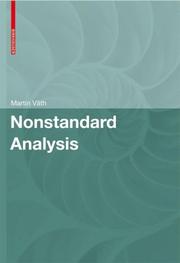
ISBN: 3764377739 9783764377731 9780817677732 0817677739 9783764377748 3764377747 Year: 2007 Publisher: Basel : Birkhäuser Basel : Imprint: Birkhäuser,
Abstract | Keywords | Export | Availability | Bookmark
 Loading...
Loading...Choose an application
- Reference Manager
- EndNote
- RefWorks (Direct export to RefWorks)
Nonstandard analysis was originally developed by Robinson to rigorously justify infinitesimals like df and dx in expressions like df/dx in Leibniz' calculus or even to justify concepts like delta-`functions'. However, the approach is much more general and was soon extended by Henson, Luxemburg and others to a useful tool especially in more advanced analysis, topology, and functional analysis. The book is an introduction with emphasis on those more advanced applications in analysis which are hardly accessible by other methods. Examples of such topics are a deeper analysis of certain functionals like Hahn-Banach limits or of finitely additive measures: From the viewpoint of classical analysis these are strange objects whose mere existence is even hard to prove. From the viewpoint of nonstandard analysis, these are rather 'explicit' objects. Formally, nonstandard analysis is an application of model theory in analysis. However, the reader of the book is not expected to have any background in model theory; instead knowledge of calculus is required and, although the book is rather self-contained, background in more advanced analysis or (elementary) topology is useful.
Nonstandard mathematical analysis --- Applied Mathematics --- Engineering & Applied Sciences --- Nonstandard mathematical analysis. --- Model theory. --- Logic, Symbolic and mathematical --- Analysis, Nonstandard mathematical --- Mathematical analysis, Nonstandard --- Non-standard analysis --- Nonstandard analysis --- Model theory --- Global analysis (Mathematics). --- Analysis. --- Analysis, Global (Mathematics) --- Differential topology --- Functions of complex variables --- Geometry, Algebraic --- Mathematical analysis. --- Analysis (Mathematics). --- 517.1 Mathematical analysis --- Mathematical analysis
Dissertation
ISBN: 9789056828158 Year: 2007 Publisher: Leuven Katholieke Universiteit Leuven
Abstract | Keywords | Export | Availability | Bookmark
 Loading...
Loading...Choose an application
- Reference Manager
- EndNote
- RefWorks (Direct export to RefWorks)
Het onderwerp van deze thesis zijn constructieve processen en hun rol in kennisrepresentatie. In een eerste deel van de tekst, bestuderen we de eigenschappen van dergelijke processen op een algebraische manier, binnen het kader van approximatie theorie. De abstracte resultaten die we hier bekomen, laten ons toe om op een uniforme en vrij eenvoudige manier concrete stellingen voor verschillende kennisrepresentatie-talen af te leiden. Met name bestuderen we op deze manier de onderwerpen van modulariteit en predikaat introductie voor logische programma's, auto-epistemische logica en default logica. In een tweede deel van de tekst, onderzoeken we het verband tussen constructieve processen en het concept van causaliteit. Door middel van een analyse van een bepaald soort causale uitspraken, tonen we aan dat causaliteit een inherent dynamisch aspect heeft, dat op een natuurlijke manier aanleiding geeft tot een formalizatie in termen van probabilistische processen. We vergelijken de resulterende taal met Bayesiaanse netwerken en tonen aan dat er een nauw verband bestaat met logische programma's, waaruit volgt dat we ook uitdrukking in dit formalisme op een causale manier kunnen interpreteren. Constructive processes play an important role in knowledge representation. Indeed, there are many formal languages whose semantics can be characterized using fixpoint criteria, that simulate, for instance, human thought processes or mathematical construction principles. Such processes can be studied in an abstract, algebraic way. This allows common properties of such languages to be examined in general, without committing to any particular syntax or semantics. In a first part of this thesis, we examine two topics in this way: first, we look at modularity of theories and, second, we consider certain transformations that extend the vocabulary of a theory to simplify some of its formulas. In both cases, we find that single algebraic theorem about constructive processes suffices to derive (partial) generalizations of a number of different existing results for logic programs, autoepistemic logic, and default logic. In a second part of the thesis we examine the link between constructive processes and the concept of causality. We observe that causality has an inherent dynamic aspect, i.e., that, in essence, causal information concerns the evolution of a domain over time. Motivated by this observation, we construct a new representation language for causal knowledge, whose semantics is defined explicitly in terms of constructive processes. This is done in a probabilistic context, where the basic steps that make up the process are allowed to have non-deterministic effects. We then show that a theory in this language defines a unique probability distribution over the possible outcomes of such a process. This result offers an appealing explanation for the usefulness of causal information and links our explicitly dynamic approach to more static causal probabilistic modelling languages, such as Bayesian networks. We also show that this language, which we have constructed to be a natural formalization of a certain kind of causal statements, is closely related to logic programming. This result demonstrates that, under an appropriate formal semantics, a rule of a normal, a disjunctive or a certain kind of probabilistic logic program can be interpreted as a description of a causal event. Als we kennis willen delen, bewaren, of misschien zelfs alleen al maar denken, moeten we deze uitdrukken in taal. Het is bekend dat uitdrukkingen in natuurlijke talen (Nederlands, Frans, ...) vaak vaag of ambigu zijn. In het dagelijkse leven stelt dit weinig of geen problemen, aangezien een goede verstaander de bedoelde betekenis meestal wel zal begrijpen en ontbrekende informatie vanuit zijn eigen kennis kan aanvullen. In wiskunde of exacte wetenschappen ligt de situatie echter anders. Hier is precisie en eenduidigheid vaak van een dermate groot belang, dat natuurlijke taal eenvoudigweg niet meer voldoet. Wiskundigen maken in dergelijke situaties dan ook gebruik van hun eigen, symbolische talen, zoals bijvoorbeeld wiskundige eerste-orde logica. Het belangrijkste onderscheid tussen dergelijke formele talen en een informele natuurlijk taal, is dat een formele taal de betekenis van elke uitdrukking exact en eenduidig definieert. Formele talen zijn ook in de informatica van groot belang. Kennis die exact en eenduidig geformuleerd is, is immers ook kennis die algoritmisch gemanipuleerd kan worden en dus voor een computer bruikbaar is. Dit schept de mogelijkheid tot declaratief programmeren, waarbij een programmeur zich niet meer hoeft te bekommeren om hoe iets berekend kan worden, maar enkel maar moet aangeven wat hij wilt weten. Als hij dit in een formele taal kan neerschijven, samen met voldoende achtergrondkennis over het probleem in kwestie, dan kan---in het ideale geval---het gewenste resultaat gevonden worden door het toepassen van algemene redeneermethodes op dit specifieke geval. Opdat deze aanpak zinvol zou zijn, is het natuurlijk van belang dat de gebruikte formele taal ook effectief geschikt is om de relevante kennis in voor te stellen. Omdat het hier vaak om andere soorten van kennis gaat dan strikt wiskundige, en er in deze context bovendien ook andere eisen aan een taal gesteld worden dan in de wiskunde (zoals bijvoorbeeld berekenbaarheid), is er hier nood aan andere talen nodig dan enkel maar wiskundige eerste-orde logica. De studie van het ontwerp en gebruik van dergelijke talen is het onderwerp van het domein van de kennisrepresentatie. Constructieve processen, dwz. processen die geleidelijk een model van de wereld opbouwen, spelen een belangrijke rol in dit domein. Veel van de talen die hier beschouwd worden maken immers gebruik van dergelijke processen om de betekenis van uitdrukkingen te definieren. In deze thesis bestuderen we constructieve processen in twee verschillende omstandigheden. In een eerste deel zullen we dergelijke processen op een abstracte manier bestuderen, binnen het kader van approximatie theorie. Dit is een algebraische theorie die op een natuurlijk manier al de voornaamste semantieken van een aantal verschillende kennisrepresentatie-talen vangt, waaronder logische programma's, auto-epistemische logica en default logica. Dit betekent dat we door een enkele analyse op het niveau van approximatie theorie meteen over al deze talen iets te weten te komen. In deze thesis bestuderen we twee onderwerpen op deze manier: modulariteit en predikaat introductie. Voor deze beide onderwerpen zullen we aantonen dat onze abstracte resultaten binnen approximatie theorie ons toelaten om op een uniforme en vrij eenvoudige manier concrete stellingen af te leiden, die een aantal reeds bekende resultaten voor verschillende talen omvatten of veralgemenen. In het tweede deel van deze thesis bestuderen we dan het verband tussen constructieve processen en het concept van causaliteit. We vertrekken hier van een analyse van een bepaald soort van causale uitspraken en tonen aan dat deze een inherent dynamisch aspect hebben, dat op een natuurlijke manier aanleiding geeft tot constructieve processen. Omdat causale uitspraken vaak gepaard gaan met een zekere mate van onzekerheid, zullen we in deze context probabilistische processen beschouwen, waarvan de basisstappen een niet-deterministisch effect kunnen hebben. De resulterende probabilistische modelleringstaal vergelijken we met die van Bayesiaanse netwerken. Bovendien tonen we aan dat er een nauw verband bestaat met logische programma's, wat aantoont dat ook uitdrukkingen in dit formalisme op een causale manier geinterpreteerd kunnen worden. Knowledge representation is the area of computer science that deals with the study of formal languages, such as mathematical logic. Constructive processes (i.e., derivations which gradually build up a model of the world) play an important role in this domain. In a first part of this thesis, we study such process in an abstract, algebraic way. This proves to be a convenient way of deriving general theorems about different knowledge representation languages. In a second part of the thesis, we investigate the relation between constructive processes and the concept of causality. We observe that causal statements are essentially statements about things that could happen, which makes it natural to formalize their meaning in terms of constructive processes. Based on this observation, we construct the formal language of CP-logic as a new way of representing causal knowledge.
681.3*I2 <043> --- Academic collection --- 681.3*F41 <043> --- Artificial intelligence. AI--Dissertaties --- Mathematical logic: computability theory; computational logic; lambda calculus; logic programming; mechanical theorem proving; model theory; proof theory;recursive function theory--See also {681.3*F11}; {681.3*I22}; {681.3*I23}--Dissertaties --- Theses --- 681.3*I2 <043> Artificial intelligence. AI--Dissertaties
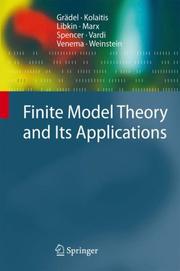
ISBN: 9783540004288 Year: 2007 Publisher: New York : Springer,
Abstract | Keywords | Export | Availability | Bookmark
 Loading...
Loading...Choose an application
- Reference Manager
- EndNote
- RefWorks (Direct export to RefWorks)
Computational complexity. --- Constraint databases. --- Finite model theory. --- Computer science --- Computational complexity --- Constraint databases --- Finite model theory --- 681.3*F13 --- 681.3*F41 --- 681.3*H23 --- 681.3*I24 --- 681.3*I28 --- 681.3*I24 Knowledge representation formalisms and methods: frames and scripts; predicate logic; relation systems; representation languages; procedural and rule-based representations; semantic networks (Artificial intelligence) --- Knowledge representation formalisms and methods: frames and scripts; predicate logic; relation systems; representation languages; procedural and rule-based representations; semantic networks (Artificial intelligence) --- 681.3*H23 Languages: data description languages; DDL; data manupulation languages; DML;query languages; report writers (Database management) --- Languages: data description languages; DDL; data manupulation languages; DML;query languages; report writers (Database management) --- Model theory --- Databases --- Complexity, Computational --- Electronic data processing --- Machine theory --- 681.3*I28 Problem solving, control methods and search: backtracking; dynamic program- ming; graph and tree search strategies; heuristics; plan execution, formationand generation (Artificial intelligence)--See also {681.3*F22} --- Problem solving, control methods and search: backtracking; dynamic program- ming; graph and tree search strategies; heuristics; plan execution, formationand generation (Artificial intelligence)--See also {681.3*F22} --- 681.3*F13 Complexity classes: complexity hierarchies; machine-independent complexity; reducibility and completeness; relations among complexity classes; relations among complexity measures (Computation by abstract devices)--See also {681.3*F2} --- Complexity classes: complexity hierarchies; machine-independent complexity; reducibility and completeness; relations among complexity classes; relations among complexity measures (Computation by abstract devices)--See also {681.3*F2} --- 681.3*F41 Mathematical logic: computability theory; computational logic; lambda calculus; logic programming; mechanical theorem proving; model theory; proof theory;recursive function theory--See also {681.3*F11}; {681.3*I22}; {681.3*I23} --- Mathematical logic: computability theory; computational logic; lambda calculus; logic programming; mechanical theorem proving; model theory; proof theory;recursive function theory--See also {681.3*F11}; {681.3*I22}; {681.3*I23} --- Mathematics --- Informatique


ISBN: 3540688048 3540004289 Year: 2007 Publisher: Berlin, Heidelberg : Springer Berlin Heidelberg : Imprint: Springer,
Abstract | Keywords | Export | Availability | Bookmark
 Loading...
Loading...Choose an application
- Reference Manager
- EndNote
- RefWorks (Direct export to RefWorks)
This book gives a broad overview of core topics of finite model theory: expressive power, descriptive complexity, and zero-one laws, together with selected applications to database theory and artificial intelligence, especially, constraint databases and constraint satisfaction problems. The final chapter provides a concise modern introduction to modal logic, which emphasizes the continuity in spirit and technique with finite model theory. This underlying spirit involves the use of various fragments of, and hierarchies within, first order, second order, fixed point, and infinitary logics to gain insight into phenomena in complexity theory and combinatorics. The book emphasizes the use of combinatorial games, such as extensions and refinements of the Ehrenfeucht-Fraissé pebble game, as a powerful technique for analyzing the expressive power of such logics, and illustrates how deep notions from model theory and combinatorics, such as o-minimality and tree-width, arise naturally in the application of finite model theory to database theory and AI. Students of logic and computer science will find here the tools necessary to embark on research in finite model theory, and all readers will experience the excitement of a vibrant area of application of logic to computer science.
Finite model theory. --- Computational complexity. --- Constraint databases. --- Databases --- Complexity, Computational --- Electronic data processing --- Machine theory --- Computer science --- Model theory --- Mathematics --- Information theory. --- Computer science. --- Software engineering. --- Logic design. --- Database management. --- Theory of Computation. --- Mathematical Logic and Formal Languages. --- Software Engineering. --- Computation by Abstract Devices. --- Logics and Meanings of Programs. --- Database Management. --- Data base management --- Data services (Database management) --- Database management services --- DBMS (Computer science) --- Generalized data management systems --- Services, Database management --- Systems, Database management --- Systems, Generalized database management --- Design, Logic --- Design of logic systems --- Digital electronics --- Electronic circuit design --- Logic circuits --- Switching theory --- Computer software engineering --- Engineering --- Informatics --- Science --- Communication theory --- Communication --- Cybernetics --- Computers. --- Mathematical logic. --- Computer logic. --- Computer science logic --- Logic, Symbolic and mathematical --- Algebra of logic --- Logic, Universal --- Mathematical logic --- Symbolic and mathematical logic --- Symbolic logic --- Algebra, Abstract --- Metamathematics --- Set theory --- Syllogism --- Automatic computers --- Automatic data processors --- Computer hardware --- Computing machines (Computers) --- Electronic brains --- Electronic calculating-machines --- Electronic computers --- Hardware, Computer --- Computer systems --- Calculators --- Cyberspace
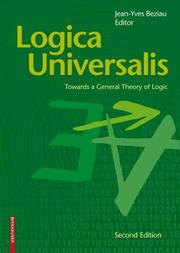
ISBN: 1280970022 9786610970025 3764383542 3764383534 Year: 2007 Publisher: Basel : Birkhäuser Basel : Imprint: Birkhäuser,
Abstract | Keywords | Export | Availability | Bookmark
 Loading...
Loading...Choose an application
- Reference Manager
- EndNote
- RefWorks (Direct export to RefWorks)
"I find this book extremely useful and important, because it signifies the arrival of a new renaissance in logic, a new revival not only of logic, but of the vision of logic as a unifying tool for science as a whole, including mathematics, physics, cosmology, computer science and AI. The book and the vision behind it give logic, conceived as a scientific study of rationality, new unifying power, new perspectives, and new horizons." Istvan Németi, Hungarian Academy of Sciences "Modern logic has been intimately connected with algebra since its origins in figures such as Boole, De Morgan, and Peirce. But while universal algebra is a long recognized field, universal logic has only recently been named as such. This is perhaps because classical logic was until relatively recently taken by many as the "one true logic". But with the proliferation of special purpose non-classical logics in recent years, universal logic is clearly a field whose time has come. This book contains many excellent papers demonstrating the value of this approach." J. Michael Dunn, Indiana University "Modern logic is exploding into manifold applications, and its core research agenda is expanding accordingly. Thus, it becomes of great importance to reflect and rethink the notion of a logical system, which has served us so well for a century now. This book contains timely, broad, and unifying reflections on logical systems and logical consequence, and helps us think where our discipline is going." Johan van Benthem, University of Amsterdam & Stanford University.
Logic, Symbolic and mathematical. --- Model theory. --- Logic, Symbolic and mathematical --- Algebra of logic --- Logic, Universal --- Mathematical logic --- Symbolic and mathematical logic --- Symbolic logic --- Mathematics --- Algebra, Abstract --- Metamathematics --- Set theory --- Syllogism --- Computer science. --- Mathematical Logic and Foundations. --- Mathematical Logic and Formal Languages. --- Arithmetic and Logic Structures. --- Informatics --- Science --- Mathematical logic. --- Arithmetic and logic units, Computer. --- Arithmetic and logic units, Computer --- Computer arithmetic --- Electronic digital computers --- Circuits
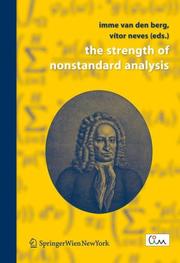
ISBN: 128113936X 9786611139360 3211499059 3211499040 3211998926 Year: 2007 Publisher: Vienna : Springer Vienna : Imprint: Springer,
Abstract | Keywords | Export | Availability | Bookmark
 Loading...
Loading...Choose an application
- Reference Manager
- EndNote
- RefWorks (Direct export to RefWorks)
Nonstandard Analysis enhances mathematical reasoning by introducing new ways of expression and deduction. Distinguishing between standard and nonstandard mathematical objects, its inventor, the eminent mathematician Abraham Robinson, settled in 1961 the centuries-old problem of how to use infinitesimals correctly in analysis. Having also worked as an engineer, he saw not only that his method greatly simplified mathematically proving and teaching, but also served as a powerful tool in modelling, analyzing and solving problems in the applied sciences, among others by effective rescaling and by infinitesimal discretizations. This book reflects the progress made in the forty years since the appearance of Robinson’s revolutionary book Nonstandard Analysis: in the foundations of mathematics and logic, number theory, statistics and probability, in ordinary, partial and stochastic differential equations and in education. The contributions are clear and essentially self-contained.
Nonstandard mathematical analysis --- Analysis, Nonstandard mathematical --- Mathematical analysis, Nonstandard --- Non-standard analysis --- Nonstandard analysis --- Model theory --- Global analysis (Mathematics). --- Logic, Symbolic and mathematical. --- Distribution (Probability theory. --- Differential equations, partial. --- Number theory. --- Analysis. --- Mathematical Logic and Foundations. --- Probability Theory and Stochastic Processes. --- Partial Differential Equations. --- Number Theory. --- History of Mathematical Sciences. --- Number study --- Numbers, Theory of --- Algebra --- Partial differential equations --- Distribution functions --- Frequency distribution --- Characteristic functions --- Probabilities --- Algebra of logic --- Logic, Universal --- Mathematical logic --- Symbolic and mathematical logic --- Symbolic logic --- Mathematics --- Algebra, Abstract --- Metamathematics --- Set theory --- Syllogism --- Analysis, Global (Mathematics) --- Differential topology --- Functions of complex variables --- Geometry, Algebraic --- Mathematical analysis. --- Analysis (Mathematics). --- Mathematical logic. --- Probabilities. --- Partial differential equations. --- Mathematics. --- History. --- Probability --- Statistical inference --- Combinations --- Chance --- Least squares --- Mathematical statistics --- Risk --- 517.1 Mathematical analysis --- Mathematical analysis --- Math --- Science --- Annals --- Auxiliary sciences of history
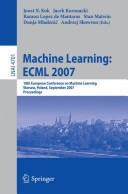
ISBN: 9783540749578 3540749578 3540749586 Year: 2007 Publisher: Berlin New York : Springer,
Abstract | Keywords | Export | Availability | Bookmark
 Loading...
Loading...Choose an application
- Reference Manager
- EndNote
- RefWorks (Direct export to RefWorks)
The two premier annual European conferences in the areas of machine learning and data mining have been collocated ever since the ?rst joint conference in Freiburg, 2001. The European Conference on Machine Learning (ECML) traces its origins to 1986, when the ?rst European Working Session on Learning was held in Orsay, France. The European Conference on Principles and Practice of KnowledgeDiscoveryinDatabases(PKDD) was?rstheldin1997inTrondheim, Norway. Over the years, the ECML/PKDD series has evolved into one of the largest and most selective international conferences in machine learning and data mining. In 2007, the seventh collocated ECML/PKDD took place during September 17–21 on the centralcampus of WarsawUniversityand in the nearby Staszic Palace of the Polish Academy of Sciences. The conference for the third time used a hierarchical reviewing process. We nominated 30 Area Chairs, each of them responsible for one sub-?eld or several closely related research topics. Suitable areas were selected on the basis of the submission statistics for ECML/PKDD 2006 and for last year’s International Conference on Machine Learning (ICML 2006) to ensure a proper load balance amongtheAreaChairs.AjointProgramCommittee(PC)wasnominatedforthe two conferences, consisting of some 300 renowned researchers, mostly proposed by the Area Chairs. This joint PC, the largest of the series to date, allowed us to exploit synergies and deal competently with topic overlaps between ECML and PKDD. ECML/PKDD 2007 received 592 abstract submissions. As in previous years, toassistthereviewersandtheAreaChairsintheir?nalrecommendationauthors had the opportunity to communicate their feedback after the reviewing phase.
Machine learning --- Apprentissage automatique --- Congresses. --- Congrès --- Computer Science --- Mechanical Engineering - General --- Engineering & Applied Sciences --- Mechanical Engineering --- 681.3*I2 <063> --- 681.3*F22 <063> --- 681.3*F41 <063> --- 681.3*H28 <063> --- Artificial intelligence. AI--Congressen --- Nonnumerical algorithms and problems: complexity of proof procedures; computations on discrete structures; geometrical problems and computations; pattern matching --See also {?681.3*E2-5}; {681.3*G2}; {?681.3*H2-3}--Congressen --- Mathematical logic: computability theory; computational logic; lambda calculus; logic programming; mechanical theorem proving; model theory; proof theory;recursive function theory--See also {681.3*F11}; {681.3*I22}; {681.3*I23}--Congressen --- Database applications--Congressen --- Conferences - Meetings --- Information Technology --- Artificial Intelligence --- 681.3*I2 <063> Artificial intelligence. AI--Congressen --- Artificial intelligence. --- AI (Artificial intelligence) --- Artificial thinking --- Electronic brains --- Intellectronics --- Intelligence, Artificial --- Intelligent machines --- Machine intelligence --- Thinking, Artificial --- Computer science. --- Algorithms. --- Mathematical logic. --- Database management. --- Computer Science. --- Artificial Intelligence (incl. Robotics). --- Algorithm Analysis and Problem Complexity. --- Mathematical Logic and Formal Languages. --- Database Management. --- Bionics --- Cognitive science --- Digital computer simulation --- Electronic data processing --- Logic machines --- Machine theory --- Self-organizing systems --- Simulation methods --- Fifth generation computers --- Neural computers --- Data base management --- Data services (Database management) --- Database management services --- DBMS (Computer science) --- Generalized data management systems --- Services, Database management --- Systems, Database management --- Systems, Generalized database management --- Algebra of logic --- Logic, Universal --- Mathematical logic --- Symbolic and mathematical logic --- Symbolic logic --- Mathematics --- Algebra, Abstract --- Metamathematics --- Set theory --- Syllogism --- Algorism --- Algebra --- Arithmetic --- Informatics --- Science --- Foundations --- Computer software. --- Artificial Intelligence. --- Software, Computer --- Computer systems
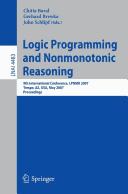
ISBN: 9783540721994 3540721991 9786610940721 1280940727 1280307978 3540722009 Year: 2007 Publisher: Berlin ; Heidelberg : Springer-Verlag,
Abstract | Keywords | Export | Availability | Bookmark
 Loading...
Loading...Choose an application
- Reference Manager
- EndNote
- RefWorks (Direct export to RefWorks)
Logic programming --- Nonmonotonic reasoning --- Programmation logique --- Raisonnement non-monotone --- Congresses. --- Congrès --- Logic programming -- Congresses. --- Nonmonotonic reasoning -- Congresses. --- Computer Science --- Mechanical Engineering - General --- Engineering & Applied Sciences --- Mechanical Engineering --- 681.3*I23 <063> --- 681.3*I24 <063> --- 681.3*I2 <063> --- 681.3*F41 <063> --- 681.3*D16 <063> --- Deduction and theorem proving: answer/reason extraction; reasoning; resolution; metatheory; mathematical induction; logic programming (Artificial intelligence)--Congressen --- Knowledge representation formalisms and methods: frames and scripts; predicate logic; relation systems; representation languages; procedural and rule-based representations; semantic networks (Artificial intelligence)--Congressen --- Artificial intelligence. AI--Congressen --- Mathematical logic: computability theory; computational logic; lambda calculus; logic programming; mechanical theorem proving; model theory; proof theory;recursive function theory--See also {681.3*F11}; {681.3*I22}; {681.3*I23}--Congressen --- Computer science--?*D16 --- Information Technology --- Artificial Intelligence --- 681.3*I2 <063> Artificial intelligence. AI--Congressen --- 681.3*I24 <063> Knowledge representation formalisms and methods: frames and scripts; predicate logic; relation systems; representation languages; procedural and rule-based representations; semantic networks (Artificial intelligence)--Congressen --- 681.3*I23 <063> Deduction and theorem proving: answer/reason extraction; reasoning; resolution; metatheory; mathematical induction; logic programming (Artificial intelligence)--Congressen --- Non-monotonic reasoning --- Computer science. --- Software engineering. --- Computer programming. --- Mathematical logic. --- Artificial intelligence. --- Computer Science. --- Software Engineering/Programming and Operating Systems. --- Artificial Intelligence (incl. Robotics). --- Mathematical Logic and Formal Languages. --- Programming Techniques. --- Reasoning --- AI (Artificial intelligence) --- Artificial thinking --- Electronic brains --- Intellectronics --- Intelligence, Artificial --- Intelligent machines --- Machine intelligence --- Thinking, Artificial --- Bionics --- Cognitive science --- Digital computer simulation --- Electronic data processing --- Logic machines --- Machine theory --- Self-organizing systems --- Simulation methods --- Fifth generation computers --- Neural computers --- Algebra of logic --- Logic, Universal --- Mathematical logic --- Symbolic and mathematical logic --- Symbolic logic --- Mathematics --- Algebra, Abstract --- Metamathematics --- Set theory --- Syllogism --- Computers --- Electronic computer programming --- Electronic digital computers --- Programming (Electronic computers) --- Coding theory --- Computer software engineering --- Engineering --- Informatics --- Science --- Programming --- Artificial Intelligence.
Book
ISBN: 9783540755586 3540755586 3540755608 Year: 2007 Publisher: Berlin New York : Springer,
Abstract | Keywords | Export | Availability | Bookmark
 Loading...
Loading...Choose an application
- Reference Manager
- EndNote
- RefWorks (Direct export to RefWorks)
Logic programming --- Automatic theorem proving --- Artificial intelligence --- Programmation logique --- Théorèmes --- Intelligence artificielle --- Congresses. --- Congrès --- Démonstration automatique --- Computer Science --- Mechanical Engineering - General --- Engineering & Applied Sciences --- Mechanical Engineering --- 681.3*D24 <063> --- 681.3*H2 <063> --- 681.3*F3 <063> --- 681.3*F41 <063> --- 681.3*I2 <063> --- 681.3*I23 <063> --- Computer programming --- Automated theorem proving --- Theorem proving, Automated --- Theorem proving, Automatic --- Proof theory --- AI (Artificial intelligence) --- Artificial thinking --- Electronic brains --- Intellectronics --- Intelligence, Artificial --- Intelligent machines --- Machine intelligence --- Thinking, Artificial --- Bionics --- Cognitive science --- Digital computer simulation --- Electronic data processing --- Logic machines --- Machine theory --- Self-organizing systems --- Simulation methods --- Fifth generation computers --- Neural computers --- Program verification: assertion checkers; correctness proofs; reliability; validation (Software engineering)--See also {681.3*F31}--Congressen --- Database management: security; integrity; protection--See also {?681.5*E5}--Congressen --- Logics and meanings of programs (Theory of computation)--Congressen --- Mathematical logic: computability theory; computational logic; lambda calculus; logic programming; mechanical theorem proving; model theory; proof theory;recursive function theory--See also {681.3*F11}; {681.3*I22}; {681.3*I23}--Congressen --- Artificial intelligence. AI--Congressen --- Deduction and theorem proving: answer/reason extraction; reasoning; resolution; metatheory; mathematical induction; logic programming (Artificial intelligence)--Congressen --- Information Technology --- Artificial Intelligence --- 681.3*I23 <063> Deduction and theorem proving: answer/reason extraction; reasoning; resolution; metatheory; mathematical induction; logic programming (Artificial intelligence)--Congressen --- 681.3*I2 <063> Artificial intelligence. AI--Congressen --- Computer science. --- Software engineering. --- Computer programming. --- Computer logic. --- Mathematical logic. --- Artificial intelligence. --- Computer Science. --- Software Engineering/Programming and Operating Systems. --- Artificial Intelligence (incl. Robotics). --- Programming Techniques. --- Software Engineering. --- Logics and Meanings of Programs. --- Mathematical Logic and Formal Languages. --- Algebra of logic --- Logic, Universal --- Mathematical logic --- Symbolic and mathematical logic --- Symbolic logic --- Mathematics --- Algebra, Abstract --- Metamathematics --- Set theory --- Syllogism --- Computer science logic --- Logic, Symbolic and mathematical --- Computers --- Electronic computer programming --- Electronic digital computers --- Programming (Electronic computers) --- Coding theory --- Computer software engineering --- Engineering --- Informatics --- Science --- Programming --- Logic design. --- Artificial Intelligence. --- Design, Logic --- Design of logic systems --- Digital electronics --- Electronic circuit design --- Logic circuits --- Switching theory
| Listing 1 - 10 of 11 | << page >> |
Sort by
|

 Search
Search Feedback
Feedback About
About Help
Help News
News